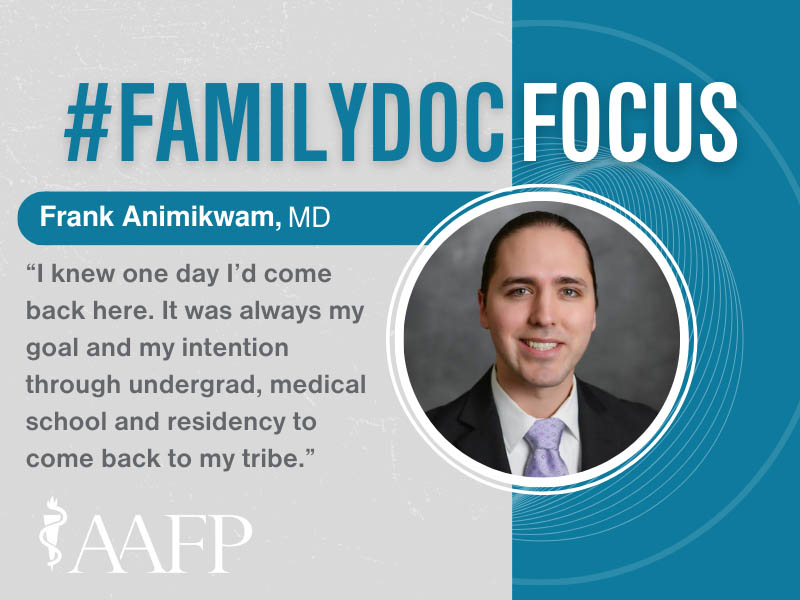Native American FP Finds Fulfillment Serving His Tribe
Nov. 30, 2023, David Mitchell — Finding your place in health care can be a challenge, but Frank Animikwam, M.D., never had any doubts about where he wanted to practice.

“I knew one day I’d come back here,” said Animikwam, medical director for the Little Traverse Bay Bands of Odawa Indians in Petoskey, Mich. “It was always my goal and my intention through undergrad, medical school and residency to come back to my tribe.”
The tribe’s previous medical director, Animikwam’s second cousin Terry Samuels, M.D., held the position for nearly two decades. He gave Animikwam his first shadowing experience while he was in high school.
“I got there and was nervous,” Animikwam said. “He said, ‘If you’re going to be shadowing me here, you need to wear a white coat.’ So, he gave me one of his and I was swimming in it. I thought, ‘Oh, wow. I don’t fill this out physically or metaphorically.’ He was an inspiration for me, my family and our tribe because we had a native doctor. We had someone who had gone out and achieved this level of education and training, came back and showed that it could be done and role modeled it.”
Nearly 20 years later, memories from Animikwam’s first day in a family medicine clinic still stand out. First, Samuels had a visit with a tribal elder who was suffering with terminal cancer.
“I remember she was crying, and her husband was consoling her,” Animikwam said. “Terry sat with them, was present with them and held her hand to let them know they were not going through it alone. I’ll never forget that.”
Later that day, Animikwam had a memorable conversation with an elderly male patient who explained the significance of Samuels’ role.
“He told me that if Terry wasn’t here, he wouldn’t come here for care,” said Animikwam, who collaborates with traditional Native healers to address patients’ cultural and spiritual concerns. “But because Terry was from our tribe, the man trusted him. That experience stood out to me, too, the importance of seeing oneself in in another. He was able to connect on that level and be comfortable, culturally and spiritually, to come in and seek Western medicine in our tribe setting.”
Animikwam said he hears similar sentiments from his own patients. Now he is working to expose others to health care in the tribe setting. He’s a clinical assistant professor of family medicine for the Michigan State University College of Human Medicine, supervising students during two-week clerkships at the tribe clinic. Animikwam also is working to establish a rotation for residents from the McLaren Northern Michigan/MSU Family Medicine Program.
Animikwam has about 2,000 patients at the tribe’s main clinic, which serves both its citizens and members of neighboring tribes. The tribe opened a second clinic, Crooked Tree Wellness Center, about 10 minutes away, in January in order to serve native and non-native patients who are recipients of Medicaid.
“A lot of the tribe’s citizens have family members who are non-natives, maybe through marriage,” said Animikwam, who is the medical director for both sites. “They can’t receive care at the tribe clinic, so we opened up that clinic. If they’re Medicaid recipients, they can be seen there.”
American Indian and Alaska Native people make up nearly 3% of the U.S. population but represent just 0.4% of the nation’s physician workforce. Animikwam is taking on leadership roles to address not only health disparities, but also representation in health care.
He is a member of the Michigan AFP’s Diversity, Equity and Inclusion Committee and a member of the Michigan Statewide Independent Living Council. In May, he served as his chapter’s minority delegate to the AAFP’s National Conference of Constituency Leaders, where he co-authored a pair of resolutions, which were adopted, that address inclusion, collaboration and appropriate care of native and disabled communities.
“You’ve got to make sure that you have representation of all people, especially in an organization like the AAFP,” he said. “There’s so much diversity, so we have to make sure we have representation from people who are going to bring their unique experiences to the table. You need to have that insight and have those people advocating for those unique ways of life that not everyone’s aware of. That’s not just our Native American community. There are other communities, too, that need representation. We learn from one another by hearing different perspectives, and we can bring different ideas about addressing the shared challenges we all face in health care.”
Animikwam also is contributing to the AAFP’s new Family Medicine Champions program, which will prepare participants to educate aspiring health care workers about careers in family medicine. Animikwam is one of several family physicians from diverse backgrounds and practice settings who describe their work in a learning module titled “A Week in the Life of a Family Physician.” Registration for the program’s first cohort closes Dec. 15.